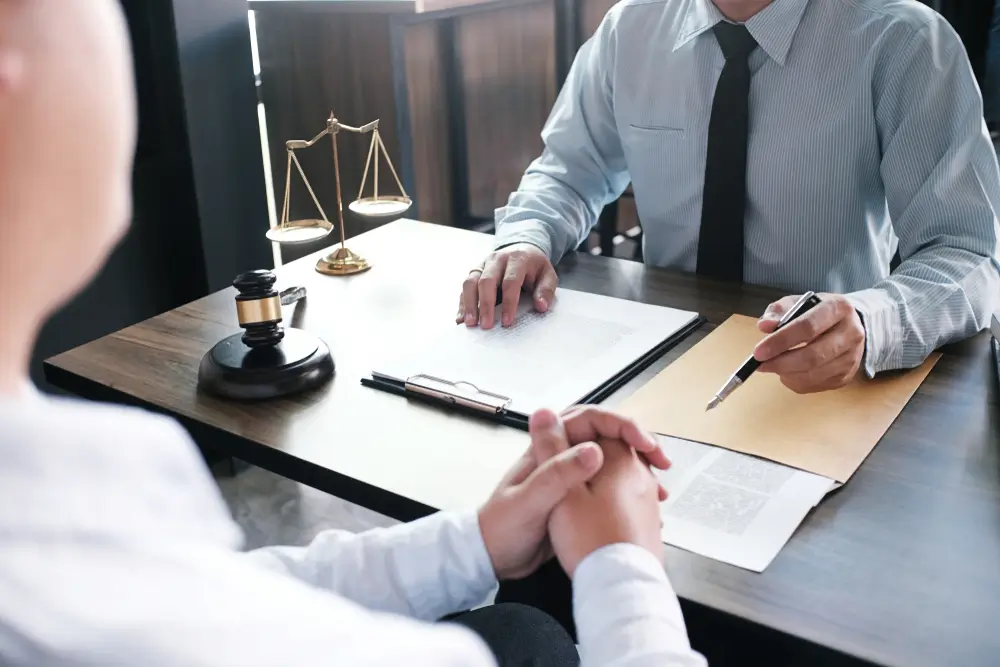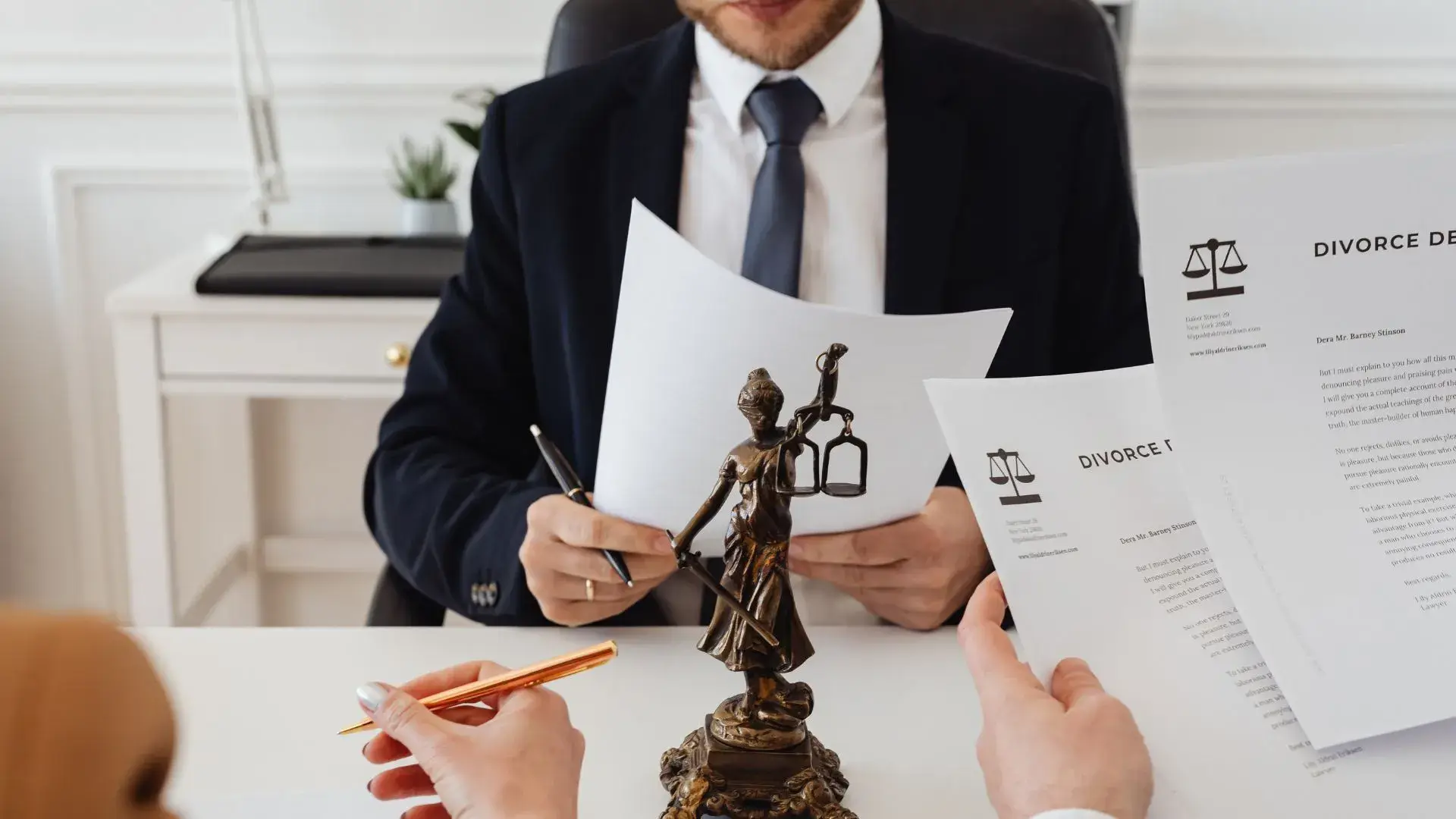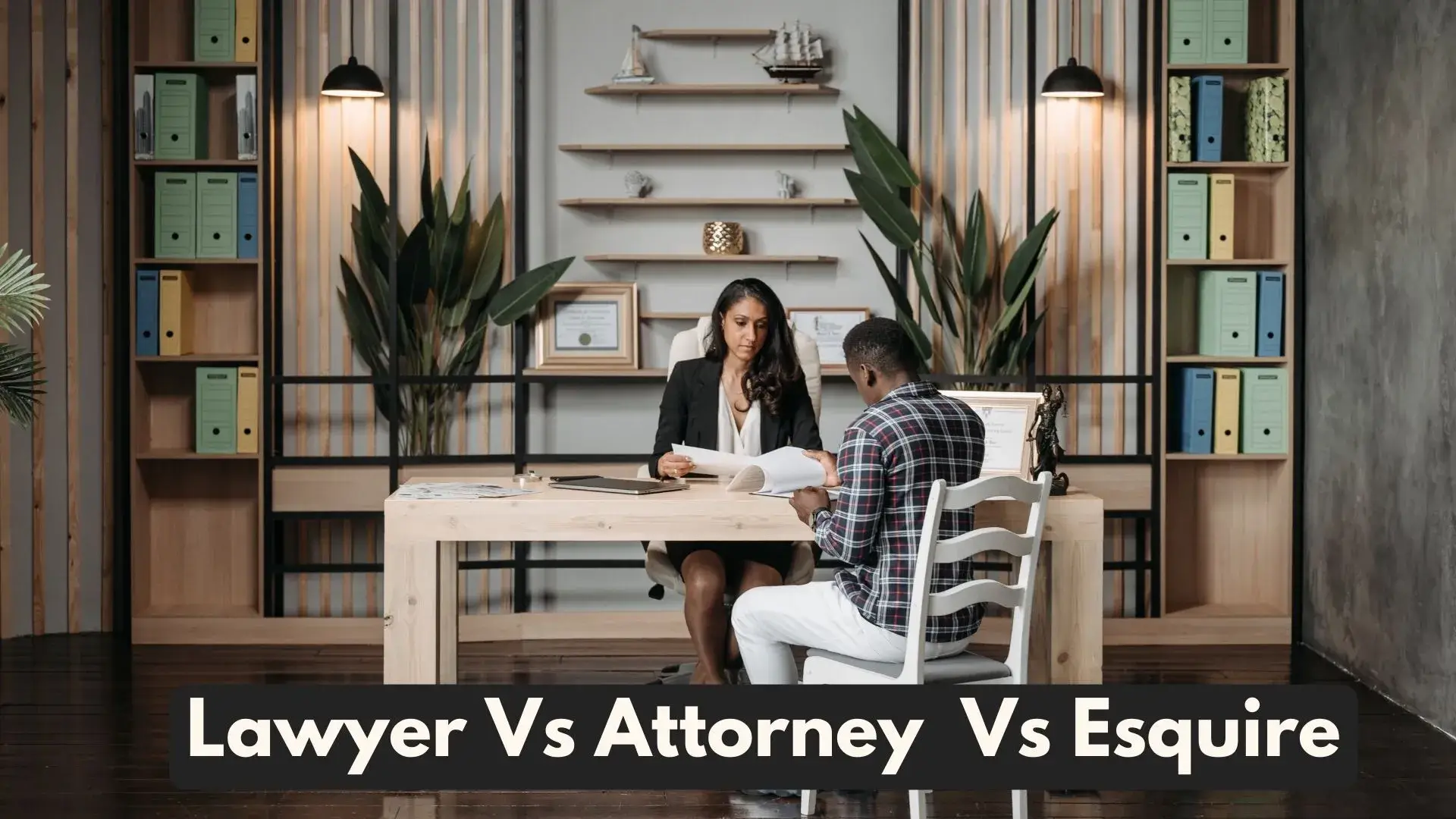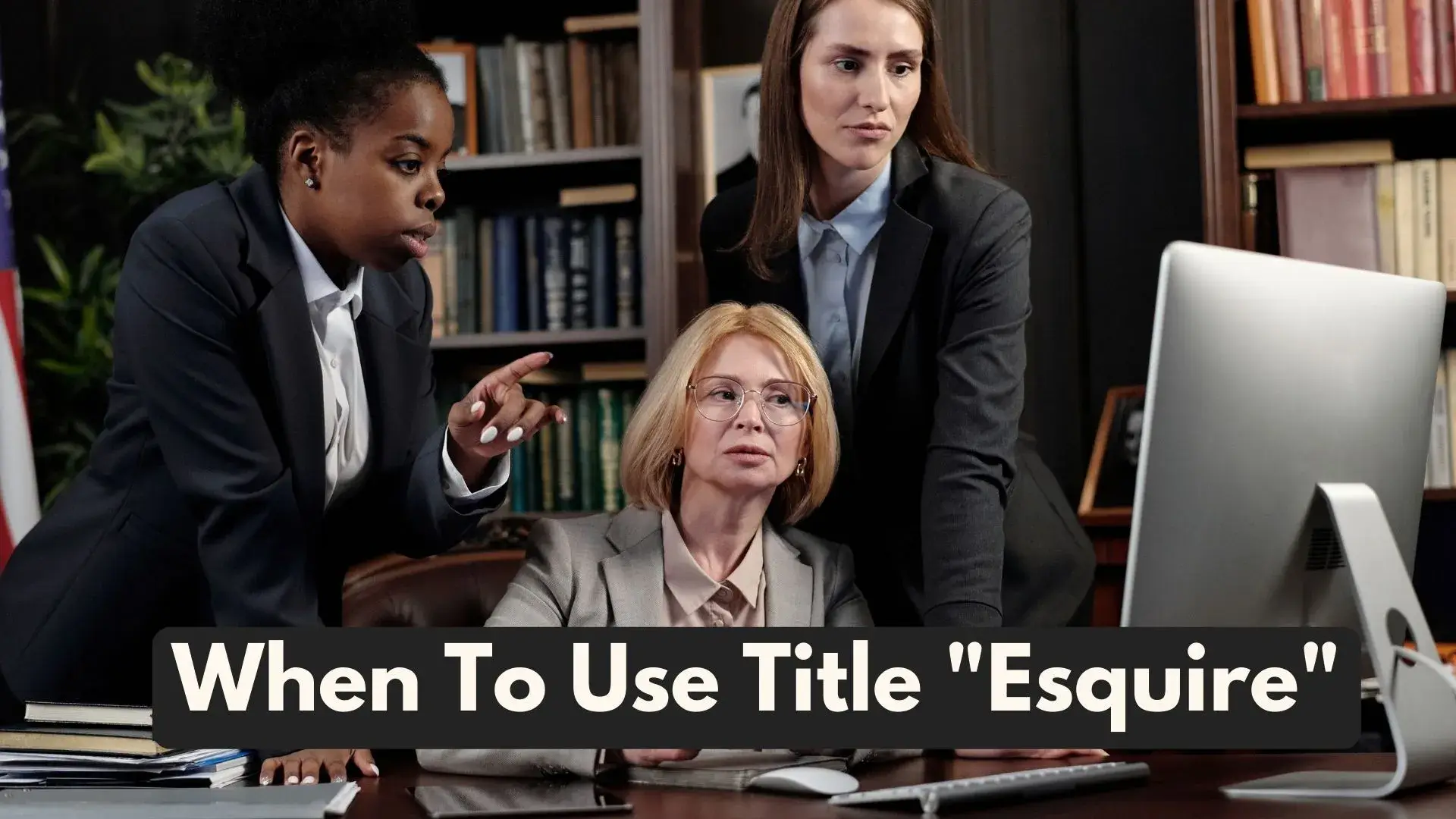Lawyers play a crucial role in our society, providing legal expertise and representation to individuals and businesses alike.
When seeking legal assistance, you may come across the term “Esquire” associated with lawyers.
In this article, we will explore what “Esquire” means, the significance of hiring a lawyer Esquire, and how to find the right legal professional for your needs.
Overview Of Lawyer Esquire
Lawyer Esquire, commonly referred to as “Esq.,” is a term used to address or designate a lawyer.
It is an honorary title indicating that the person is licensed to practice law.
Understanding the meaning of “Esquire” helps establish the professional standing and qualifications of a lawyer.
What Does “Esquire” Mean?
The term “Esquire” originated from England and was historically used to address individuals of a certain social class.
Over time, it became associated with lawyers and was used as an honorific title. Today, it is used in various countries, including the United States, to denote a licensed attorney.
✅JD vs Esquire [ Understanding The Clear Difference ]
Understanding The Role of Lawyer Esquire in Society
In society, a lawyer, also referred to as an Esquire (abbreviated as Esq. ), plays a crucial role.
In addition to representing clients and ensuring the smooth operation of the legal system, lawyers play a critical role in upholding justice. They play a variety of important roles, some of which are listed below:
✅ Legal Representation
In a variety of legal contexts, attorneys represent their clients as their advocates. As they prepare to argue their clients’ claims in court, they gather evidence, research pertinent laws and cases.
Individuals will have a fair trial and their rights will be upheld thanks to this representation.
✅ Legal Advice
Lawyers offer individuals, companies, and organizations legal counsel and advice.
They aid in the creation of legal documents such contracts, wills, and employment agreements, as well as helping their clients understand their rights and obligations under the law.
✅ Dispute Resolution
In dispute resolution through negotiation, mediation, or litigation, lawyers play a crucial role.
They want to prevent extra litigation and expenditures by coming to an arrangement that is acceptable to all parties.
Lawyers represent their clients in court when conflicts reach a critical stage by putting forth arguments and supporting data.
✅ Upholding the Rule of Law
Lawyers have a crucial role in upholding the rule of law in society. They work to make sure that laws are administered consistently and fairly, and that individuals and organizations are held responsible for their deeds.
Lawyers contribute to social stability and orderliness by their expertise and understanding of the legal system.
✅ Social Justice
Lawyers have the chance to work in a variety of law-related fields, such as advocacy for civil rights, human rights, and the public interest.
By promoting marginalized communities, combating discrimination, and working to uphold individual liberties, they can support social justice causes.
✅ Legislative and Policy Work
Some lawyers are involved in legislative and policy work, either through their work with advocacy organizations or as legal advisers to governmental entities.
They take part in the creation of laws, rules, and policies, ensuring that they are consistent with society demands and constitutional precepts.
✅ Education and Research
In order to be part of legal education and research, lawyers perform legal research and writing legal publications as well as offering legal courses.
For enhancing the understanding and growth of law the knowledge and skills they possess thus help in training the young lawyers.
In other words, individuals holding the title of Esquire are as diverse in the functions that they perform as are other lawyers.
They are lawyers who provide legal advice and representation to other lawyers, to clients or to other parties involved in the course of a trial or case all in effort to protect lawful order, and every person’s rights.
✅JD vs Esquire [ Understanding The Clear Difference ]
What Are the Educational & Professional Requirements for Becoming a Lawyer Esquire?

Prospective legal esquires have to meet a variety of educational and professional requirements in the law.
First, a candidate for admission to the undergraduate law program must obtain a Baccalaureate degree, usually, an academic program taking four years to complete offered by a university or college in any course of study. English, political science, and history may offer insights, but there is no special major to complete.
To be awarded a Juris Doctor (J.D.) an individual must attend law school, this is after acquiring a bachelors degree. Over three academic years, law school involves both classroom and theoretical framework teachings, application of principles and professionalism.
After taking the required courses in law school, people are required to take the bar test for the jurisdiction they wish to work in.
Their understanding of the law is tested by the bar exam, a test that may be different in every state across the United States or country across the globe. Any professional intending to be a lawyer has to seek permission to practice law in the desired region after passing the test known as bar examination.
Every state already has its own requirements for licensing some of which may include character and fitness checks. People can be lawyers Esquire to start their working careers in the legal field by following these steps.
✅ Understanding Lawyer Vs Attorney
Areas of Specialization
Based on their interests, areas of experience, and the demands of their customers, lawyers Esquire might specialize in a variety of legal fields. The following are some typical areas of specialization in the legal field:
✅ Corporate Law
Lawyers that practice corporate law concentrate on counseling businesses on legal matters such contracts, mergers and acquisitions, corporate governance, and regulatory compliance.
✅ Criminal Law
Lawyers specializing in criminal defense assist both individuals and organizations charged with crimes. Theft, violence, drug violations, and white-collar crimes are just a few of the things they deal with in court.
✅ Family Law
Family lawyers handle legal matters involving family ties, such as divorce, child custody, adoption, and domestic abuse. Prenuptial agreements and matters relating to guardianship may also receive their assistance.
✅ Real Estate Law
Real estate lawyers handle legal matters pertaining to real estate, such as leasing, zoning and land use, property disputes, and construction matters.
✅ Intellectual Property Law
Intellectual property (IP) lawyers assist clients in defending their intangible assets, including trade secrets, patents, copyrights, and trademarks. They offer assistance with issues involving IP registration, licensing, and infringement.
✅ Employment Law
Employment lawyers concentrate on workplace-related issues such as employment contracts, discrimination, harassment, wrongful termination, wage and hour conflicts, and workplace safety requirements.
✅ Environmental Law
Environmental lawyers handle legal matters relating to pollution, natural resource management, land use, and sustainability. They may advocate for environmental causes or represent clients in legal disputes affecting environmental compliance.
✅ Immigration Law
Immigration lawyers assist individuals, families, and businesses with immigration and citizenship-related matters. They deal with immigration compliance issues, asylum claims, deportation defense, and visa applications.
✅ Health Law
Legal issues in the healthcare sector are handled by attorneys specialized in health law. In order to handle matters like regulatory compliance, medical malpractice, and patient rights, they may collaborate with healthcare providers, hospitals, insurance firms, or patients.
✅ Tax Law
Tax lawyers offer guidance and advocacy in matters involving tax laws and rules. They offer assistance to both individuals and businesses with tax planning, tax disputes, and tax compliance.
These are only a few examples of the many specializations available in the legal field. Depending on their interests and level of experience, lawyers Esquire may decide to concentrate on one or more practice areas.
The Importance of Hiring a Lawyer Esquire
Hiring a lawyer Esquire is crucial for various reasons. First, lawyers have the legal expertise to handle complex cases.
They comprehend the legal system since they studied and trained in their disciplines. This expertise allows them to provide correct legal advice and handle legal issues successfully on behalf of their clients.
Second, lawyers protect their clients’ rights. They defend their clients’ rights during legal processes. Lawyers can defend your rights in criminal, civil, and administrative cases.
Lawyers provide specialized counsel. They thoroughly review your case, analyze legal options, and advise you. Their expertise allows them to provide you with risks, rewards, and repercussions of legal activities. This advice can help you win your case.
Lawyers can negotiate on your behalf and seek advantageous settlements. They are trained in negotiating strategies and can negotiate with opposing parties or their legal representatives.
If litigation is necessary, lawyers can present your case in court and advocate for you.
Why Do Lawyers Use Esquire?
In several English-speaking nations, especially in the United States, the term “esquire” is frequently used as a courtesy title for lawyers. It is usually written after the lawyer’s name and is shortened as “Esq.”
The term “esquire” has a long and distinguished history that can be traced back to medieval England, where it was a respectable title for members of the upper social class who were not nobility but held prominent positions in society. The title was eventually connected to the legal industry.
The title “Esq.” is now commonly used by lawyers to denote their standing as professionals. It is regarded as a professional courtesy and is used as a form of address. It shows that the person has obtained the required education and training to practice law, is an admitted attorney, and is licensed to do so.
Even though it is more frequently used in the US, not all lawyers use the title “Esq.” The use of the title may be less widespread or absent entirely in different nations and legal systems. It should be noted that the usage of “Esq.” is a professional convention rather than a legal obligation.
How to Find a Reliable Lawyer Esquire?
Finding a reliable lawyer Esquire requires careful consideration and research. Start by seeking recommendations from trusted sources, such as friends, family, or other professionals. Online directories and legal associations can also
provide valuable information about lawyers in your area. When selecting a lawyer Esquire, consider their experience, reputation, and expertise in the relevant legal area. It is also important to schedule initial consultations to assess their communication style, approachability, and compatibility with your needs.
Find a reliable lawyer Esquire is crucial to ensure legal counsel of the highest caliber. Find a trustworthy and skilled lawyer by following these steps:
✅ Referrals: Ask family, friends, or coworkers who have had good experiences with lawyers for suggestions. Finding a reliable lawyer might be aided by their firsthand knowledge.
✅ Bar Association: Local or state bar associations. They can direct you to local lawyers who specialize in your practice area.
✅ Online directories: Use online directories like the American Bar Association’s Lawyer Referral Directory or local legal directories. These directories let you find lawyers by region, specialty, and client reviews.
✅ Online Reviews: Read client reviews and testimonials online. Avvo, Yelp, and Google Reviews might reveal the experience of others who have hired the lawyer you’re considering.
✅ Consultations: Consult lawyers. A lot of lawyers provide free or reduced fee initial consultations. Use these encounters to discuss your case, analyze their competence, and evaluate their communication and professionalism.
✅ Experience and credentials: Check the lawyer’s schooling, bar entrance, and professional organization memberships. Consider their experience with instances like yours. A lawyer with experience can help.
✅ Communication and Compatibility: Assess the lawyer’s communication abilities and how comfortable you feel discussing your case. A reliable lawyer should be a good listener, sensitive to your inquiries, and able to explain difficult legal ideas. You should also get along with the lawyer.
✅ Fee Structure: Discuss lawyer fees during consultation. Know if they charge hourly, flat, or contingency fees. To minimize future misconceptions, transparency about fee structures and billing procedures is crucial.
By following these steps, you can boost your chances of finding a reliable lawyer Esquire who is knowledgeable, experienced, and qualified to handle your legal problem.
✅ Understanding Lawyer Vs Attorney
Understanding Legal Fees and Billing Practices
Legal fees and billing practices vary among lawyers and law firms. It is essential to have a clear understanding of how lawyers charge for their services.
Some lawyers may work on an hourly fee basis, while others may offer fixed fees or contingency arrangements. Request a detailed fee agreement upfront to avoid any surprises and ensure transparency regarding costs.
Understanding legal fees and billing processes of Esquire lawyers is essential when engaging their services. Key points to understand how legal fees are organized and billed:
✅ Hourly Rates
Many Esquire lawyers charge hourly. They bill by time. Experience, competence, and location affect hourly rates. Ask if the rate varies per lawyer or team member.
✅ Flat Fees
Legal matters may be flat-fee. This implies you pay a fixed price for specified services regardless of time. Clarify the flat fee arrangement’s services and any additional fees that may apply.
✅ Retainers
Esquire may require a retainer. This sum secures their services and is billed against as work advances. Understand how the retainer will be used, if it is refundable, and how future fees will be handled.
✅ Contingency Fees
In certain circumstances, including as personal injury or employment lawsuits, Esquire lawyers may work on a contingency fee basis. Winning or settling the case is their fee. They receive a percentage if successful. If unsuccessful, they may not receive a fee, but you may be responsible for other fees.
✅ Billing Increments
Esquire bill in six- or fifteen-minute time increments. Even small contacts may be billed as minimum time. Knowing billing increments helps track time and expenditures.
✅ Bill Statements
Lawyers Esquire should produce billing statements with work, hours, and fees. Check statements for correctness and clarity. Discuss issues immediately.
✅ Fee Agreements
Before hiring a lawyer Esquire, make sure there is a documented fee agreement that covers fees, billing, and other costs. Read and clarify the agreement.
Inform your lawyer. Esquire regarding fees and billing. Discussing and discussing these issues beforehand creates a transparent and beneficial connection.
Let’s Demystify…What to Expect During the Initial Consultation?
A lawyer Esquire will discuss your legal issue during the initial meeting. You can share information about your case, ask questions, and determine whether the lawyer is the right fit for your needs during this meeting.
Provide pertinent documents and information, and use this time to assess the lawyer’s knowledge, communication skills, and case strategy.
✅ Understanding Lawyer Vs Attorney
The Process of Working with a Lawyer Esquire
Once you have selected a lawyer, Esquire, they will walk you through the legal process. A strategy tailored to your specific case will be developed after gathering the relevant data and conducting legal research.
It is imperative that you and your attorney stay in constant contact because only through open dialogue will you and your lawyer be able to properly represent your interests, keep you informed of the status of your case, and offer you advice on crucial choices.
Esquire lawyers have a specialized process for efficient collaboration and representation. The usual steps are:
✅ Initial Consultation
An first contact with the lawyer Esquire to discuss your legal case starts the process. You assess your case, ask questions, and assess the lawyer’s expertise and suitability during this meeting.
To comprehend your circumstances, the lawyer may request documents or information.
✅ Retaining the Lawyer
You must retain the lawyer if you opt to engage their services. Signing a retainer agreement sets forth the representation’s fees, billing processes, and services.
✅ Gathering Information And Data
The process of obtaining information for your case will start as soon as you hire a lawyer.
This may entail requesting documents, interviews, or legal research. Providing the lawyer with all pertinent facts and participating in a timely manner can improve the process.
✅ Case Assessment and Strategy
Lawyer Esquire will examine the evidence and assess the case. They will create a customized legal strategy based on their knowledge.
They’ll explain the outcomes and provide advise.
✅ Legal Documentation and Representation
The lawyer will prepare or review legal documents such as contracts, agreements, pleadings, or court filings depending on the nature of your case.
These documents will be accurate, legal, and safeguard your interests. The lawyer will represent you in discussions, hearings, and court proceedings.
✅ Communication and Updates
Your lawyer Esquire should keep you informed throughout the process. They will provide updates on your case, answer questions, and address any issues you may have.
A good attorney-client relationship requires good communication.
✅ Settlement Negotiations or Litigation
Depending on the nature of your case, your lawyer Esquire may engage in settlement negotiations with opposing parties or their attorneys.
If a fair settlement cannot be achieved, the lawyer will prepare for litigation and represent your interests in court. They will argue, cross-examine, and support you.
✅ Case Resolution
The lawyer will help you complete the legal process after your case is completed, whether by settlement, court ruling, or other ways.
This may include reading and signing legal documents, enforcing court orders or settlement terms, or helping with post-resolution issues.
Maintain open and honest communication with your lawyer Esquire, provide needed information and documents promptly, and follow their directions throughout the process.
By working together, you can win your legal case.
The Benefits of Hiring & Working With Lawyer Esquire for Personal Legal Matters
In personal legal matters, such as estate planning, family law disputes, or personal injury claims, hiring a lawyer Esquire can bring numerous benefits.
They have the knowledge and experience to navigate complex legal procedures, protect your rights, and negotiate favorable outcomes.
A lawyer Esquire can provide invaluable guidance and support during emotionally challenging times.
The Benefits of Hiring a Lawyer Esquire for Business Legal Matters
A lawyer Esquire is necessary for businesses to design contracts, handle employee difficulties, assure compliance with laws and regulations, and protect intellectual property.
A lawyer’s knowledge of business law can safeguard your interests, assist in the resolution of conflicts, and offer proactive legal counsel to avoid potential legal hazards.
Here are the benefits of hiring and working with a lawyer Esquire for personal legal matters in bullet points:
- Legal expertise and knowledge of the law
- Protection of your rights and interests
- Strategic advice tailored to your specific situation
- Handling of legal documentation and representation in court
- Access to a network of professionals and resources
- Efficient and timely management of legal procedures
- Objective perspective and rational decision-making
- Increased chances of achieving a favorable outcome
How To Maintain Confidentiality and Attorney-Client Privilege?
Building a reliable and fruitful relationship with your lawyer requires upholding confidentiality and the attorney-client privilege.
Open and honest communication, sharing of all pertinent information, and limiting disclosure to third parties are all important for upholding these standards. It is recommended to sign a written engagement contract with a confidentiality clause.
The confidentiality of your information is further safeguarded by using secure communication methods and making support employees aware of their obligation.
However, it’s important to know that there are legal exceptions to the attorney-client privilege, like disclosing potential criminal intent or following court orders.
You can protect the confidentiality of your communications and maintain the privacy of your legal issues by upholding these principles, maintaining a solid attorney-client relationship, and following to these rules.
✅ Understanding Lawyer Vs Attorney
Conclusion
By offering legal advice and counsel, lawyer Esquires play a vital role in society.
The outcome of your legal concerns can be significantly impacted by your understanding of the significance of employing a lawyer Esquire and the process of choosing the right legal professional.
When choosing legal representation, you can make an informed choice by taking into account the aforementioned aspects.
FAQs
❓ Can I address any lawyer as “Esquire”?
While “Esquire” is commonly associated with lawyers, it is not mandatory to use the title. The use of “Esquire” varies across different jurisdictions and cultural contexts. It’s best to follow local customs and preferences when addressing lawyers formally.
❓ What is the difference between a lawyer and a lawyer Esquire?
The term “lawyer Esquire” is often used interchangeably with “lawyer” and denotes the same profession. “Esquire” is an honorary title that lawyers may use to indicate their legal qualifications and standing. However, not all lawyers choose to use the title.
❓ How can I verify a lawyer Esquire’s credentials?
To verify a lawyer Esquire’s credentials, you can check with your local bar association or legal regulatory body. These organizations maintain records of licensed attorneys and can provide information on a lawyer’s qualifications, disciplinary history, and any other relevant details.
❓ What should I do if I’m unable to afford a lawyer Esquire?
If you cannot afford a lawyer Esquire, you may be eligible for legal aid or pro bono services. Contact your local legal aid organization or bar association for information on free or low-cost legal assistance options. They can guide you on accessing legal aid programs or connecting with lawyers who offer pro bono services.
❓ How long does it take to resolve a legal matter with a lawyer Esquire?
The duration of a legal matter can vary significantly depending on its complexity, the legal procedures involved, and other factors. Some cases can be resolved quickly through negotiation or settlement, while others may require litigation and can take months or even years. Your lawyer Esquire can provide a more accurate estimate based on the specifics of your case.
❓ When Can You Use Esquire After Your Name?
Lawyers who have been admitted to the bar and are qualified to practice law may, in general, add the title “Esq.” to the end of their names.
Read In Detail
![Lawyer Esquire [ Importance, Role, Fees, & Working Guide ]](https://thelegalstories.com/wp-content/uploads/2023/05/Red-and-Black-Dark-Gamer-Sports-YouTube-Outro-1-2.webp)




![Role and Responsibilities of an Esquire [ Esquire Title, Esquire Definition & More ]](https://thelegalstories.com/wp-content/uploads/2023/06/Red-and-Black-Dark-Gamer-Sports-YouTube-Outro-1-1-2.webp)
